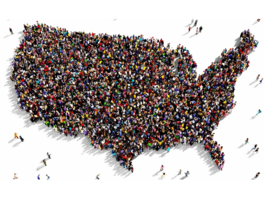Trump 2024? Former President Leads With GOP Voters
Nearly half of Republican voters pick former President Donald Trump as the candidate they want for 2024, with Florida Gov. Ron DeSantis as the only strong alternative.

Nearly half of Republican voters pick former President Donald Trump as the candidate they want for 2024, with Florida Gov. Ron DeSantis as the only strong alternative.

-- Based on presidential voting patterns, a much larger proportion of U.S. House districts strongly favor one party and a much smaller proportion are closely divided than 50 years ago.
-- However, gerrymandering is not the major reason for this trend. Partisan polarization has increased dramatically in U.S. states and counties, whose boundaries have not changed.
-- Moreover, despite the growing partisan divide evident in presidential voting, the competitiveness of House elections has changed very little over the past 5 decades because the personal advantage of incumbency has declined sharply during this period.

More than four out of five Americans believe the minimum wage – currently $7.25 an hour – should be raised to at least $9.50, but fewer than half believe a minimum wage increase would help the economy.

Democratic voters don’t seem very impressed with Vice President Kamala Harris, and want their party to be more like President Joe Biden.

The American Medical Association now tells doctors: Use woke language! It's issued a 54-page guide telling doctors things like, don't say "equality"; say "equity." Don't say "minority"; say "historically marginalized."

The Rasmussen Reports Immigration Index for the week of February 13-17, 2022, decreased to 86.4, down nearly four points from 90.2 two weeks earlier

Two-thirds of voters say crime is getting worse in America and even more expect the issue to be important in the midterm congressional elections.

What if two years ago, when COVID-19 first hit these shores, our politicians hadn't panicked?

Not so long ago, Democrats seemed the party of the future.

Twenty-nine percent (29%) of Likely U.S. Voters think the country is heading in the right direction, according to a new Rasmussen Reports national telephone and online survey for the week ending February 17, 2022.

George Washington’s birthday (February 22, 1732) has been a federal holiday since 1879, but is colloquially known as President’s Day to include Abraham Lincoln (born February 12, 1809). Despite their admiration for Lincoln, most Americans don’t think Honest Abe deserves a separate holiday.

In surveys last week, this is what America told Rasmussen Reports...

The 2022 midterm elections are now 263 days away, and Republicans have a 13-point lead in their bid to recapture control of Congress.

Itinerant policy journalist Ezra Klein, now with the New York Times, has highlighted something interesting about the Biden Democrats' now-defunct Build Back Better package -- something beyond its huge cost (trillions) and its failure to get majority support in the Democratic Congress, just like the single-payer health care bill that recently failed to pass in California's Democratic supermajority legislature.

When NBC's Lester Holt asked President Joe Biden what might prompt him to send U.S. troops to rescue Americans fleeing Ukraine, Biden replied: "There's not. That's a world war when Americans and Russia start shooting at one another."

A majority of voters think special counsel John Durham’s accusations against Hillary Clinton’s 2016 presidential campaign are very important, and agree with former President Donald Trump that it’s a scandal worse than Watergate.

Most voters believe that President Joe Biden’s mental abilities have declined since he took office, and two-thirds agree with GOP members of Congress who have urged the president to take a cognitive test and release the results.

— More than 20% of the nation’s counties gave 80% or more of its 2-party presidential votes to either Donald Trump or Joe Biden.
— Trump won the vast majority of these counties, but because Biden’s blowout counties are much more populous, he got many more votes out of his “super landslide” counties than Trump got out of his.
— Trump’s blowouts were concentrated in white, rural counties in the Greater South, Interior West, and Great Plains, while Biden’s were in a smattering of big cities, college towns, and smaller counties with large percentages of heavily Democratic nonwhite voters.

Nearly two years into the COVID-19 pandemic, many Americans have grown tired of mandatory mask policies, but Democratic voters remain convinced that masks are effective and should be required in public places, including schools.
